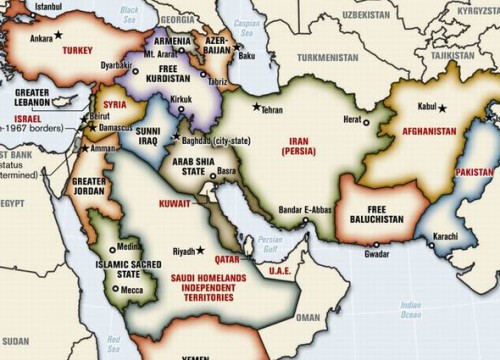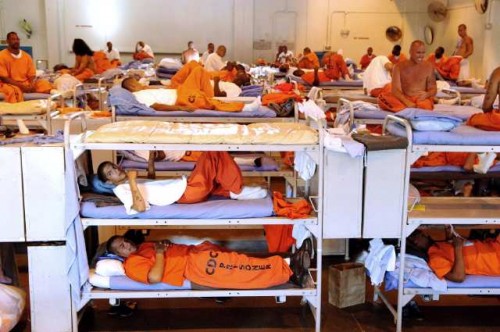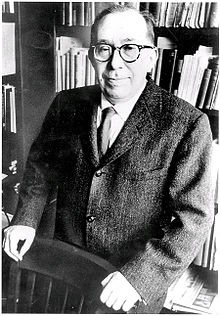[1] « L’USAID et les réseaux terroristes de Bush », par Edgar González Ruiz, Réseau Voltaire, 17 août 2004.
[2] « La Fondation Ford, paravent philanthropique de la CIA » et « Pourquoi la Fondation Ford subventionne la contestation », par Paul Labarique, Réseau Voltaire, 5 et 19 avril 2004.
[3] « 1965 : Indonésie, laboratoire de la contre-insurrection », par Paul Labarique, Réseau Voltaire, 25 mai 2004.
Dans la seconde partie de son enquête, Wayne Madsen s’intéresse à la biographie de la mère et du beau-père du Président Barack Obama. Il retrace leur parcours en tant qu’agents de la CIA d’abord à l’Université de Hawaii, où s’élaboraient quelques-uns des projets les plus sombres de l’Agence, puis en Indonésie, alors que les États-Unis préparaient un immense massacre de sympathisants communistes. Leur carrière s’inscrit dans cette période qui vit les débuts de la mondialisation en Asie et dans le reste du monde. À la différence de la dynastie Bush, Barack Obama a su cacher ses propres liens avec la CIA et en particulier, ceux de sa famille, jusqu’à aujourd’hui. Madsen conclut par cette question : « Que cache encore Barack Obama ? »
Dans la première partie de ce dossier spécial, le Wayne Madsen Report (WMR) révélait les liens entre Barack Obama senior et le convoyage aérien entre l’Afrique et les États-Unis d’un groupe de 280 étudiants originaires d’Afrique du Sud et des nations d’Afrique de l’Est indépendantes ou sur le point de le devenir. En leur attribuant des diplômes universitaires, les États-Unis s’assuraient la sympathie des heureux élus et espéraient contrer les projets similaires que mettaient en œuvre l’Union soviétique et la Chine. Barack Obama senior fut le premier étudiant étranger à s’inscrire à l’Université de Hawaii. Obama senior et la mère de Barack Obama, Ann Stanley Dunham, se rencontrèrent en cours de russe en 1959 ; ils se marièrent en 1961.
Le programme d’invitation d’étudiants africains était géré par le leader nationaliste Tom Mboya ; il était le mentor et ami d’Obama senior, et comme lui originaire de la tribu des Luo. Les documents de la CIA cités dans la première partie de ce dossier établissaient la collaboration active de Mboya avec la CIA dans le but d’empêcher les nationalistes prosoviétiques et prochinois de prendre l’ascendant sur les mouvements nationalistes panafricains dans les milieux politique, étudiant et ouvrier.
L’un des opposants les plus acharnés de Mboya était le premier Président de la République du Ghana, Kwame Nkrumah, renversé en 1966 lors d’une opération montée par la CIA. L’année suivante, Barack Obama et sa mère rejoignirent Lolo Soetoro en Indonésie. Soetoro avait rencontré Ann Dunham en 1965 à l’Université de Hawaii, alors que le jeune Barack était âgé de quatre ans.
En 1967 donc, Barack et sa mère s’installaient à Jakarta. En 1965, Lolo Soetoro avait été rappelé par le général Suharto pour servir dans le haut-commandement militaire et aider à la planification, avec le soutien de la CIA, du génocide d’Indonésiens et de Sino-indonésiens procommunistes à travers tout le pays. Suharto consolida son pouvoir en Indonésie en 1966, l’année même où Mboya aida la CIA à trouver les soutiens nécessaires parmi les nationalistes panafricains pour renverser le Président Nkrumah au Ghana.
L’East-West Center de l’Université de Hawaii et le coup d’État de la CIA contre Sukarno
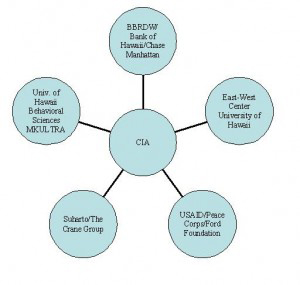
- Liens entre les diverses institutions et la CIA.
Ann Dunham rencontra Lolo Soetoro à l’East-West Center de l’Université de Hawaii. Ce centre était lié depuis longtemps aux activités de la CIA dans la zone Asie / Pacifique. En 1965, l’année où Dunham rencontra et épousa Lolo Soetoro, un nouveau doyen fut nommé à l’East-West Center : Howard P. Jones, qui avait été l’ambassadeur des États-Unis en Indonésie lors de sept années capitales pour le pays entre 1958 et 1965. Jones était présent à Jakarta quand Suharto et ses officiers agissant pour le compte de la CIA planifièrent le renversement de Sukarno, accusé, à l’instar du PKI (le Parti communiste indonésien), d’être allié à la Chine [1].
Le 10 octobre 1965, alors qu’il était le doyen de l’East-West Center, Jones publia un article pour leWashington Post dans lequel il prenait la défense de Suharto dans le coup d’État contre Sukarno. Le Post l’invitait à commenter ce coup d’État, décrit comme un « contre-coup d’État » pour reprendre le pouvoir aux mains des communistes. Jones déclarait que Suharto n’avait fait que répondre à un putsch communiste contre Sukarno mené par le Lieutenant-colonel Untung, « un capitaine de bataillon relativement inconnu, en poste dans la garde présidentielle. »
Jones, dont les propos reflètent le contenu des rapports de la CIA issus de l’ambassade des États-Unis à Jakarta, poursuivait son article en affirmant que le prétendu putsch communiste du 30 septembre 1965 « était tout près de réussir, après le meurtre de six officiers du haut-commandement. Il aurait bien pu réussir si le ministre de la Défense Nasution et un certain nombre d’autres généraux n’avaient pas réagi suffisamment rapidement pour organiser un contre-putsch spectaculaire. » Bien entendu, ce dont Jones se garda d’informer les lecteurs duPost était que Suharto avait fortement bénéficié du soutien de la CIA.
Ni Sukarno ni le gouvernement indonésien, au sein duquel siégeaient les leaders de deuxième et de troisième rang du PKI, ne reprochèrent aux communistes ces assassinats. On ne peut pas exclure l’hypothèse que ces meurtres soient une opération sous fausse bannière organisée par la CIA et Suharto, destinée à porter les accusations sur le PKI. Deux jours après le putsch de Suharto, les participants à une manifestation orchestrée par la CIA incendièrent le quartier général du PKI à Jakarta. En défilant devant l’ambassade états-unienne, qui abritait également une antenne de la CIA, ils scandaient les mots : « Longue vie aux États-Unis ! »
Untung déclara quant à lui que, lorsqu’il réalisa que Suharto et la CIA préparaient le coup d’État pour le jour de parade de l’armée indonésienne, le 5 octobre 1965, Sukarno et lui, suivis des militaires leur étant restés fidèles, passèrent les premiers à l’action. Jones répondit qu’il voyait dans cette version « la traditionnelle propagande communiste. » Suharto s’engagea contre Sukarno le 1er octobre. Jones répéta « qu’il n’y avait pas une once de vérité dans l’accusation portée contre la CIA d’avoir agi contre Sukarno. » Les historiens ont prouvé le contraire. Jones accusait les communistes de profiter de la santé fragile de Sukarno pour exclure tout candidat susceptible de lui succéder. Leur but, toujours selon Jones, était d’imposer D. N. Aidit, le chef du PKI, à la succession de Sukarno. Sukarno ne mourut qu’en 1970, alors qu’il se trouvait en résidence surveillée.
Un document de la CIA, auparavant classé secret et non daté, mentionne que « Sukarno[souhaitait] revenir à la configuration d’avant-putsch. Il [refusait] d’accuser le PKI et le Mouvement de 30 septembre [du Lieutenant-colonel Untung] ; il [appela] plutôt à l’unité du peuple indonésien et [dissuada] les velléités de vengeance. Mais il ne [parvint] pas à empêcher l’armée de poursuivre ses opérations contre le PKI ; il [agit] même dans leur sens en nommant le général Suharto à la tête de l’armée. » Suharto et le beau-père de « Barry » Obama Soetoro, Lolo Soetoro, ignorèrent les appels de Sukarno à l’apaisement, comme le découvriraient très vite les Indonésiens.

- Après l’échec du coup d’État militaire attribué aux officiers des mouvances de gauche en 1965, Suharto (à gauche) déclencha de sanglantes purges anticommunistes au cours desquelles un million de civils furent tués.
Le massacre des populations sino-indonésiennes par Suharto est évoqué dans les documents de la CIA au travers de la description du parti Baperki : « Les sympathisants du parti de gauche Baperki, très implanté dans les zones rurales, sont majoritairement d’origine sino-indonésienne. » Une note déclassifiée de la CIA, datée du 6 octobre 1966, démontre l’étendue du contrôle et de la supervision exercés par la CIA dans le coup d’État contre Sukarno ; de nombreux agents servaient d’intermédiaires avec les unités armées de Suharto postées aux abords du palais présidentiel à Bogor et de diverses ambassades dans tout le pays, dont le consulat des États-Unis à Medan. Ce consulat surveillait les sympathisants de gauche dans cette ville de l’île de Sumatra et, selon un mémo de la CIA du 2 octobre 1965, porta à la connaissance de l’Agence le fait que « le consul soviétique disposait d’un avion prêt à évacuer les citoyens soviétiques de Sumatra. » La note du 6 octobre recommandait également d’empêcher Untung de recueillir trop de soutien parmi les populations de l’intérieur de l’île de Java.

- Ann Dunham Soetero « gagnant les cœurs et les esprits » des fermiers et des artisans javanais dans le village de Kajar.
Un rapport hebdomadaire déclassifié de la CIA concernant l’Indonésie, daté du 11 août 1967 et intitulé « Le Nouvel ordre en Indonésie », fait apparaître qu’en 1966, l’Indonésie restructura son économie pour remplir les conditions d’attribution de l’aide du FMI. Dans ce rapport, la CIA se réjouissait du nouveau triumvirat installé au pouvoir en Indonésie en 1967 : Suharto, le ministre des Affaires étrangères, Adam Malik, et le Sultan de Jogjakarta [2], qui était aussi ministre de l’Économie et des Finances. La CIA se félicitait également de l’interdiction du PKI, mais concédait qu’il « rassemblait néanmoins de nombreux partisans à l’est et au centre de Java » ; c’est dans cette région que, par la suite, Ann Dunham Soetoro concentrerait ses activités pour le compte de l’USAID (Agence des États-Unis pour le développement international), la Banque mondiale et la Fondation Ford, des sociétés écrans de la CIA. Sa mission était de « gagner les cœurs et les esprits » des fermiers et des artisans javanais.
Dans une note déclassifiée de la CIA du 23 juillet 1966, le parti musulman Nahdatul Ulama (NU), le parti le plus puissant en Indonésie, est clairement vu comme un allié naturel des États-Unis et du régime de Suharto. Le rapport établit que Suharto bénéficia d’une assistance pour renverser les communistes pendant la période de contre-putsch, notamment là où le NU était le mieux implanté : à l’est de Java, au nord de Sumatra et dans plusieurs zones de l’île de Bornéo. Une autre note déclassifiée de la CIA, datée du 29 avril 1966, fait référence au PKI : « Les extrémistes musulmans ont surpassé l’armée à bien des égards en traquant et en tuant les membres du [PKI]et d’autres groupes affiliés servant de couverture. »
Dunham et Barry Soetoro à Jakarta et les activités secrètes de l’USAID
Enceinte de Barack Obama, Dunham abandonna en 1960 ses études à l’Université de Hawaii. Barack Obama senior quitta Hawaii en 1962 pour étudier à Harvard. Dunham et Obama senior divorcèrent en 1964. À l’automne 1961, Dunham s’inscrivit à l’Université de Washington et éleva son enfant. Elle réintégra l’Université de Hawaii entre 1963 et 1966. Lolo Soetoro, qui s’unit à Dunham en mars 1965, quitta Hawaii pour l’Indonésie le 20 juillet 1965, trois mois avant les opérations de la CIA contre Sukarno. Il est clair que Soetoro, promû colonel par Suharto, était rappelé à Jakarta pour participer au coup d’État contre Sukarno, des troubles qui causèrent la mort d’environ un million d’Indonésiens parmi les populations civiles. Le Président Obama préfèrerait que la presse ignore ce passé ; c’est bien ce qu’elle a fait pendant la campagne des primaires et de l’élection présidentielle de 2008.
En 1967, après son arrivée en Indonésie avec Obama junior, Dunham enseigna l’anglais à l’ambassade états-unienne de Jakarta, où se trouvait l’une des antennes de la CIA les plus importantes en Asie, relayée par d’importants bureaux situés à Surabaya, à l’est de Java, et à Medan, sur l’île de Sumatra. Jones quitta son poste de doyen à l’Université de Hawaii en 1968.
En fait, la mère d’Obama enseignait l’anglais pour le compte de l’USAID, une vaste organisation qui servait de couverture aux activités secrètes de la CIA en Indonésie et dans toute l’Asie du Sud-Est, en particulier au Laos, au Sud-Viêt Nam et en Thaïlande. Le programme de l’USAID est connu sous le nom de Lembaga Pendidikan Pembinaan Manajemen. Bien que son fils et les gens qui l’ont côtoyée à Hawaii décrivent Dunham comme un esprit libre et une « enfant des sixties », les activités qu’elle a exercées en Indonésie viennent contredire la thèse qui fait d’elle une « hippy. »
L’apprentissage du russe que suivit Dunham à Hawaii a dû se révéler très utile à la CIA en Indonésie. Dans une note déclassifiée, datée du 2 août 1966, son auteur, le Secrétaire général du Conseil de sécurité nationale des États-Unis, Bromley Smith, relatait qu’à l’instar du Japon, de l’Europe occidentale, de l’Australie, de la Nouvelle-Zélande, de la Malaisie et des Philippines, l’Union soviétique et ses alliés en Europe de l’Est avaient bien accueilli la nouvelle du putsch de Suharto car il créait une Indonésie non-alignée qui « représentait un contrepoids en Asie face à la Chine communiste. » Des archives prouvent que, comme Ann Dunham, plusieurs agents de la CIA, en poste à Jakarta avant et après le coup d’État de 1965, parlaient couramment le russe.
Lorsqu’elle séjourna en Indonésie, puis au Pakistan, Dunham Soetoro travailla pour la Fondation Ford, la Banque mondiale, la Banque asiatique de développement, la banque Rakyat (la banque publique indonésienne, propriété du gouvernement) et l’USAID.
L’USAID fut impliquée dans des opérations secrètes de la CIA en Asie de Sud-Est. Le 9 février 1971, le Washington Star publia l’information selon laquelle les responsables de l’USAID au Laos savaient que le riz dont l’USAID approvisionnait l’armée laotienne était revendu à l’armée nord-vietnamienne au Laos même. Le rapport révèle que les États-Unis toléraient la revente du riz de l’USAID car l’armée laotienne n’avait ainsi plus à craindre les attaques du Nord-Vietnam et de leurs alliés communistes du Pathet Lao. L’USAID et la CIA utilisaient l’approvisionnement de riz pour obliger les tribus Méo du Laos à rejoindre le camp des États-Unis dans la guerre contre les communistes. Des fonds de l’USAID étaient destinés à venir en aide aux civils blessés et à instaurer un système d’assurance-maladie au Laos ; ils furent détournés et utilisés à des fins militaires.
En 1971, le Centre d’études vietnamiennes à l’Université de l’Illinois à Carbondale, financé par l’USAID, fut accusé d’être une société écran de la CIA. Les projets financés par l’USAID par le biais du Consortium des universités du Midwest pour les activités internationales (Midwest Universities Consortium for International Activities, MUCIA), qui inclut les Universités de l’Illinois, du Wisconsin, du Minnesota, de l’Indiana, et du Michigan, furent soupçonnés d’être des projets secrets de la CIA. Parmi ceux-ci, figuraient les programmes « d’éducation agraire » en Indonésie et d’autres projets en Afghanistan, au Mali, au Népal, au Nigeria, en Thaïlande et au Sud-Viêt Nam. Ces accusations furent émises en 1971, quand Ann Dunham travaillait pour l’USAID en Indonésie.
Dans un article du 10 juillet 1971, le New York Times accusait l’USAID et la CIA d’avoir « perdu » 1,7 milliards de dollars dévolus au programme CORDS (Civil Operations and Revolutionary Development Support). Ce programme faisait partie de l’Opération Phénix, dans le cadre de laquelle la CIA procéda à la torture et à l’assassinat de nombreux civils, patriarches et moines bouddhistes dans les villages du Sud-Viêt Nam [3]. Des sommes d’argent en provenance de l’USAID furent également reçues par une ligne aérienne détenue par la CIA en Asie du Sud-Est, Air America. En Thaïlande, le financement par l’USAID du Programme de développement rural accéléré (Accelerated Rural Development Program) cachait en fait les opérations de lutte contre l’insurrection communiste. De même, en 1971, dans les mois précédant le déclenchement de la troisième guerre indo-pakistanaise, les fonds de l’USAID destinés aux projets de travaux publics dans l’est du Pakistan furent utilisés pour la consolidation militaire des frontières avec l’Inde. Ces détournements étaient contraires à la loi états-unienne qui interdit l’utilisation des fonds de l’USAID pour des programmes militaires.
En 1972, dans un entretien avec Metromedia News, le directeur de l’USAID, le Docteur John Hannah admit que la CIA se servait de l’USAID comme société écran pour ses opérations secrètes au Laos. Hannah affirmait que l’USAID était une société écran uniquement au Laos. Pourtant, l’USAID s’est avérée servir de couverture également en Indonésie, aux Philippines, au Sud-Viêt Nam, en Thaïlande et en Corée du Sud. Les projets de l’USAID en Asie du Sud-Est devaient être approuvés par le SEADAG (Southeast Asian Development Advisory Group), un groupe élaborant des projets publics en Asie, qui devait en réalité se ranger derrière l’avis de la CIA.
En 1972, il fut prouvé que le programme Food for Peace, administré par l’USAID et le Département de l’agriculture états-unien, reçut un financement à visée militaire pour des projets au Cambodge, en Corée du Sud, en Turquie, au Sud-Viêt Nam, en Espagne, à Taïwan et en Grèce. En 1972, l’USAID ne fit parvenir de l’argent que dans les zones méridionales du Nord-Yémen, dans le but d’armer les forces nord-yéménites contre le gouvernement du Sud-Yémen, alors dirigé par les socialistes, opposés à l’hégémonie états-unienne dans la région.
L’une des institutions affiliées aux travaux de l’USAID en Indonésie était la Fondation Asie (Asia Foundation), créée dansles années 1950 avec l’aide de la CIA pour contrer l’expansion du communisme en Asie. La pension de l’East-West Center à l’Université de Hawaii était financée par la Fondation Asie. Obama senior séjourna dans cette pension à son arrivée du Kenya, après avoir bénéficié du programme d’aide aux étudiants africains organisé par l’un des agents d’influence de la CIA en Afrique, Tom Mboya.
Dunham séjourna également au Ghana, au Népal, au Bangladesh, en Inde et en Thaïlande dans le cadre de projets de microfinancement. En 1965, Barack Obama senior quitta Harvard et retourna au Kenya, accompagné de sa nouvelle épouse états-unienne. Obama senior reprit contact avec son vieil ami, le « golden boy » de la CIA Tom Mboya, et avec d’autres hommes politiques d’origine Luo, la tribu d’Obama senior. Philip Cherry dirigea l’antenne de la CIA à Nairobi de 1964 à 1967. En 1975, il fut nommé à la tête de l’antenne de la CIA à Dacca au Bangladesh. L’ambassadeur états-unien au Bangladesh de l’époque, Eugene Booster, accusa Cherry d’être impliqué dans l’assassinat du premier Président du Bangladesh, Sheik Mujiur Rahman, et d’autres membres de sa famille. L’exécution de la famille présidentielle bangladaise auraient vraisemblablement été ordonnée par le Secrétaire d’État Henry Kissinger. Le Bangladesh constituait également une étape sur l’itinéraire qu’Ann Dunham suivait pour le compte de la CIA dans le cadre de projets de micro et de macro-financement.
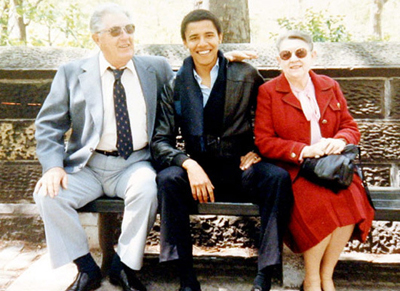
- Obama et ses grands-parents maternels, Madelyn et Stanley Dunham, en 1979. Sa grand-mère fut vice-présidente de la Banque de Hawaii, une institution bancaire utilisée par diverses sociétés écrans de la CIA.
Les banques de la CIA et Hawaii
Ann Dunham resta en Indonésie quand le jeune Obama retourna à Hawaii en 1971 ; elle confia son fils à sa mère, Madelyn Dunham. Cette dernière fut la première femme à occuper le poste de vice-président de la Banque de Hawaii à Honolulu. Diverses sociétés écrans de la CIA utilisaient alors la Banque de Hawaii. Madelyn Dunham s’occupait de la gestion des comptes cachés que la CIA utilisait pour les transferts de fonds au bénéfice des dictateurs en place en Asie, tels que le Président de la République des Philippines, Ferdinand Marcos, le Président de la République du Viêt Nam, Nguyen Van Thiêu, et le Président de la République d’Indonésie, le général Suharto. En effet, la Banque de Hawaii se chargeait du blanchiment d’argent de la CIA, afin de dissimuler le soutien qu’accordait la CIA à ses leaders politiques préférés dans la région Asie-Pacifique.
À Honolulu, l’une des sociétés bancaires les plus utilisées par la CIA pour le blanchiment d’argent était la BBRDW (Bishop, Baldwin, Rewald, Dillingham & Wong). En 1983, la CIA donna son accord pour la liquidation de la BBRDW, soupçonnée de n’être qu’une chaîne de Ponzi. À cette occasion, le sénateur Daniel Inouye — membre du Comité du renseignement du Sénat états-unien (US Senate Select Committee on Intelligence) et l’un des meilleurs amis au parlement de l’ancien sénateur de l’Alaska, Ted Stevens — déclara que le rôle de la CIA dans la BBRDW était « insignifiant. » Plus tard, on découvrit qu’Inouye mentait. En fait, la BBRDW était largement impliquée dans le financement des activités secrètes de la CIA dans toute l’Asie, dont celles d’espionnage industriel au Japon, de vente d’armes aux guérillas anticommunistes des Moudjahidine afghans et à Taïwan. John C. « Jack » Kindschi était l’un des dirigeants de la BBRDW ; avant de partir à la retraite en 1981, il fut chef de poste de la CIA à Honolulu. Le diplôme universitaire ornant le mur du bureau du président de la BBRDW, Ron Rewald, était un faux, fourni par les experts en falsification de la CIA ; son nom fut également ajouté aux archives des anciens étudiants.
Le passé de la BBRDW fut réécrit par la CIA pour faire croire à la présence de cette banque à Hawaii dès l’annexion de l’archipel en tant que territoire des États-Unis [4]. Le Président Obama se bat actuellement contre les accusations selon lesquelles ses diplômes et ses notes de cours seraient des faux, tout comme le seraient son numéro de sécurité sociale établi dans le Connecticut et certains éléments qui agrémentent son CV. La découverte des documents falsifiés de la BBRDW serait-elle à l’origine des questions qui font surface à propos du passé de Barack Obama ?
La BBRDW était installée dans le quartier d’affaires d’Honolulu, près du siège de la Banque de Hawaii, là où étaient détenus les comptes cachés de la CIA gérés par Madelyn Dunham, la grand-mère d’Obama. La Banque de Hawaii s’occupa de très nombreuses transactions financières secrètes opérées par la BBRDW.
Obama-Soetoro et « les années de tous les dangers » [5] à Jakarta
Il est clair qu’Ann Dunham Soetoro et son mari indonésien, Lolo Soetoro, le beau-père du Président Obama, étaient très étroitement liés aux activités de la CIA visant à neutraliser l’influence sino-soviétique en Indonésie pendant « les années de tous les dangers » après l’éviction de Sukarno. Le Wayne Madsen Report a découvert que des agents de haut-rang de la CIA furent nommés officiellement et officieusement à des postes de couverture en Indonésie pendant la même période, des couvertures fournies, entres autres, par l’USAID, les Peace Corps et l’USIA (US Information Agency).
L’un des contacts les plus proches de Suharto à la CIA était Kent B. Crane, qui avait figuré parmi les agents de la CIA en poste à l’ambassade états-unienne à Jakarta. Crane était si proche de Suharto, qu’après « son départ à la retraite » de la CIA, il aurait été l’un des rares hommes d’affaires « privés » à obtenir un passeport diplomatique indonésien du gouvernement Suharto. La société de Crane, le Crane Group, fournissait des armes de petit calibre aux forces militaires états-uniennes, indonésiennes et d’autres pays. Crane fut le conseiller aux Affaires étrangères du vice-président des États-Unis, Spiro Agnew ; il fut par la suite nommé ambassadeur des États-Unis en Indonésie par le Président Ronald Reagan. Cette nomination resta lettre morte à cause de ses liens suspects avec Suharto. John Holdridge, un proche de Kissinger, fut nommé à sa place ; à son départ de Jakarta, c’est Paul Wolfowitz qui le remplaça.
Les protégés de Suharto, parmi lesquels comptaient aussi Mokhtar et James Riady de Lippo Group, se virent accusés d’avoir injecté plus d’un million de dollars par le biais de contributions étrangères illégales vers les comptes de campagne de Bill Clinton en 1992. À deux reprises, le Président Obama a repoussé sa visite officielle en Indonésie ; peut-être craint-il l’intérêt que pourrait éveiller un tel déplacement sur les liens de sa mère et de son beau-père avec la CIA ?

- Ann Dunham en visite dans un élevage de canards à Bali, officiellement dans le cadre de son travail pour développer des programmes de crédit bancaire aux petites entreprises.
Dans les années 1970 et 1980, Dunham s’occupait de projets de microcrédit en Indonésie pour la Fondation Ford, l’East-West Center et l’USAID. Le Docteur Gordon Donald junior était l’une des personnes en poste à l’ambassade des États-Unis. Il aida à protéger les bâtiments de l’ambassade lors des violentes manifestations étudiantes anti-états-uniennes pendant la période du putsch contre Sukarno. Rattaché au Bureau des affaires économiques, Donald était responsable du programme de microfinancement de l’USAID destiné aux paysans indonésiens ; c’est sur ce même programme que Dunham travailla en collaboration avec l’USAID dans les années 1970, après avoir enseigné l’anglais en Indonésie, toujours pour le compte de l’USAID. Dans l’ouvrage Who’s Who in the CIA, publié en 1968 en Allemagne de l’Ouest, Donald est décrit comme un agent de la CIA, ayant également été en poste à Lahore au Pakistan, une ville dans laquelle Dunham séjournerait plus tard, dans une suite de l’hôtel Hilton, pour mener les projets de microfinancement pour la Banque asiatique de développement, durant cinq ans.
Parmi les hommes en poste à Jakarta, le Who’s Who in the CIA fait apparaitre Robert F. Grealy ; il deviendrait par la suite le directeur des relations internationales dans la zone Asie-Pacifique chez J. P. Morgan Chase, puis le directeur de la Chambre de commerce pour les États-Unis et l’Indonésie. Le Pdg de J. P. Morgan Chase, Jamie Dimon, a en outre récemment été cité comme un remplaçant potentiel de Richard Geithner, le Secrétaire du Trésor, dont le père, Peter Geithner, travaillait à la Fondation Ford et avait le dernier mot pour l’attribution des fonds destinés aux projets de microfinancement de Dunham.
Les projets inavouables de la CIA et Hawaii
Alors qu’elle séjournait au Pakistan, Ann Dunham reçut la visite de son fils Barack en 1980 et en 1981. Obama se rendit par la même occasion à Karachi, à Lahore et dans la ville indienne d’Hyderabad. Pendant cette même période, la CIA intensifiait ses opérations en Afghanistan depuis le territoire pakistanais.
Le 31 janvier 1981, le directeur-adjoint du Bureau des recherches et des rapports de la CIA (ORR, Office of Research and Reports) transmit au directeur de la CIA, Allen Dulles, une longue note, classée secret, code NOFORN [6], et aujourd’hui déclassifié. Il y fait le rapport d’une mission de collecte de renseignements diligentée entre le 17 novembre et le 21 décembre 1957 en Extrême-Orient, en Asie du Sud-Est et au Moyen-Orient.
Le chef de l’ORR y évoquait sa rencontre avec l’équipe du général à la retraire Jesmond Balmer, alors haut-responsable de la CIA à Hawaii, au sujet de la demande formulée par le chef de l’US Pacific Command pour « la collecte de nombreuses informations nécessitant de longues recherches. » Le chef de l’ORR mentionnait ensuite les recherches effectuées par la CIA pour recruter « des étudiants sinophones de l’Université de Hawaii capables de mener à bien des missions de renseignement. » Il abordait ensuite les débats qui s’étaient tenus lors d’un séminaire sur le contre-espionnage de l’Organisation du traité de l’Asie du Sud-Est qui eut lieu à Baguio entre le 26 et 29 novembre 1957. Le Comité économique avait d’abord discuté des « fonds pour le développement économique » destinés à combattre « les activités de subversion exercées par le bloc sino-soviétique dans la région », avant « d’envisager toutes les réactions susceptibles d’être mises en œuvre. »
Les délégations thaïlandaise et philippine firent beaucoup d’efforts pour obtenir le financement états-unien d’un fonds de développement économique, qui aurait enclenché d’autres projets de l’USAID dans la région, du même type que ceux dans lesquels Peter Geithner et la mère de Barack Obama s’investissaient intensément.
Une importante littérature existe sur les aspects géopolitiques des opérations secrètes de la CIA menées depuis l’Université de Hawaii ; il n’en est pas de même pour les éléments les plus inavouables de la collecte de renseignements et des opérations de type MK-ULTRA, qui n’ont pas été associées de manière systématique à l’Université de Hawaii.
Plusieurs notes déclassifiées de la CIA, datées du 15 mai 1972, font référence à l’implication du département de la Défense ARPA (Advanced Research Projects Agency) et de l’Université de Hawaii dans un programme d’études comportementales de la CIA. Ces mémos furent rédigés par Bronson Tweedy, alors directeur-adjoint de la CIA, le directeur du PRG (Program Review Group) de l’US Intelligence Community et le directeur de la CIA, Robert Helms. Ces mémos ont pour thème « les recherches menées par l’ARPA concernant le renseignement. » La note provenant du directeur du PRG aborde une conférence à laquelle participa le Lieutenant-colonel Austin Kibler, le directeur des études comportementales de l’ARPA, le 11 mai 1972. Kibler supervisait les recherches de l’ARPA sur les modifications comportementales et la surveillance à distance. Les mémos du directeur du PRG évoquent plusieurs hauts-responsables : Edward Proctor, le directeur-adjoint en charge du renseignement à la CIA, Carl Duckett, le directeur-adjoint en charge des sciences et des technologies à la CIA et John Huizenga, le directeur de l’Office of National Estimates [7].
En 1973, après que James Schlesinger, alors directeur de la CIA, ordonna une enquête administrative sur tous les programmes de la CIA, l’Agence produisit un éventail de documents sur divers programmes, désigné par l’expression « bijoux de famille. » La plupart de ces documents furent publiés en 2007 ; en même temps, on apprenait que Helms avait donné l’ordre au Docteur Sidney Gottlieb de détruire les documents portant sur les recherches qu’il menait ; ce dernier était le directeur du projet MK-ULTRA, un programme de recherche de la CIA sur les modifications comportementales, le lavage de cerveau et l’injection de drogues. Dans un mémo rédigé par l’agent de la CIA Ben Evans et adressé à William Colby, le directeur de la CIA, daté du 8 mai 1973, Duckett confiait son avis : « Il serait mal venu que M. le Directeur se déclare au courant de ce programme », désignant les expérimentations menées par Gottlieb pour le projet MK-ULTRA.
Après la publication des « bijoux de famille », plusieurs membres de l’administration du Président Gerald Ford, dont le chef de cabinet de la Maison Blanche, Dick Cheney, et le secrétaire à la Défense, Donald Rumsfeld, s’assurèrent qu’aucune révélation ne soit faite à propos des programmes de modifications comportementales et psychologiques, parmi lesquels figuraient les projets MK-ULTRA et ARTICHOKE.
Plusieurs mémos du 15 mai 1972 font référence au projet SCANATE, initié la même année. Il s’agit de l’un des premiers programmes de recherche de la CIA sur la guerre psychologique, en particulier, sur l’utilisation de psychotropes à des fins de surveillance à distance et de manipulation psychologique. Y sont mentionnés Kibler de l’ARPA, et « son sous-traitant » ; plus tard, on apprendrait qu’il s’agissait du Stantford Research Institute (SRI), situé à Menlo Park en Californie.
Helms adressa un mémo à, entre autres, Duckett, Huizenga, Proctor et au directeur de l’Agence pour le renseignement militaire (Defence Intelligence Agency, DIA) — ce dernier hériterait par la suite du projet de la CIA « GRILL FLAME » concernant la surveillance à distance. Helms insistait sur le fait que l’ARPA soutenait « depuis un certain nombre d’années » les recherches sur le comportement et les applications potentielles dont le renseignement pourrait bénéficier, « avec la participation du M.I.T., de Yale, de l’Université du Michigan, de l’UCLA, de l’Université de Hawaii et d’autres institutions ou groupes de recherche. »
La collaboration de l’Université de Hawaii avec la CIA dans le domaine de la guerre psychologique se poursuit encore aujourd’hui. Le Docteur Susan Brandon, l’actuel directeur du programme d’études comportementales mené par le Centre de contre-espionnage et de renseignement (Defence Counterintelligence and Human Intelligence Center, DCHC) au sein de la DIA, a obtenu son doctorat de Psychologie à l’Université de Hawaii. Brandon aurait été impliquée dans un programme secret, issu de la collaboration de l’APA (American Psychological Association), de la RAND Corporation et de la CIA, destiné à « améliorer les procédés d’interrogatoire » ; l’objet de ses recherches portait sur les privations de sommeil et de perception sensorielle, la soumission à des douleurs intenses et l’isolation complète, des procédés mis en œuvre sur les prisonniers de la base aérienne de Bagram en Afghanistan et d’autres prisons secrètes [8]. Brandon fut également l’assistante du directeur du Département des sciences sociales, comportementales et éducatives au Bureau des sciences et des technologies dans l’administration de George W. Bush.
Ainsi, les liens entre la CIA et l’Université de Hawaii ne s’érodèrent pas à la fin des années 1970 ; l’ancien président de l’Université de Hawaii entre 1969 et 1974, Harlan Cleveland, fut invité à donner une conférence au quartier général de la CIA le 10 mai 1977. Avant de prendre ses fonctions à l’Université de Hawaii, Cleveland fut secrétaire du Bureau pour les affaires liées aux organisations internationales (Bureau of International Organization Affairs) de 1965 à 1969.
Un mémo du directeur de la formation de l’agence, daté du 21 mai 1971, indique que la CIA recruta un officier de la Marine qui entamait le deuxième cycle de ses études à l’Université de Hawaii.
La famille Obama et la CIA
De très nombreux documents sont disponibles au sujet des liens de George H. W. Bush avec la CIA et des activités de son père et de ses enfants, dont l’ancien Président George W. Bush, pour le compte de la CIA. Barack Obama, quant à lui, a réussi à dissimuler les traces de ses propres liens avec l’Agence, tout autant que ceux de ses parents, de son beau-père et de sa grand-mère (très peu de choses sont connues à propos de son grand-père, Stanley Armour Dunham ; il est sensé avoir dirigé un commerce de meubles à Hawaii après avoir servi en Europe pendant la Deuxième guerre mondiale). Les Présidents et les vice-présidents des États-Unis ne sont soumis à aucune enquête sur leurs antécédents avant leur prise de fonction, à la différence des autres membres du gouvernement fédéral. Ce travail de vérification est laissé à la presse. En 2008, les journalistes ont lamentablement failli à leur devoir d’information en enquêtant trop superficiellement sur l’homme qui allait entrer à la Maison Blanche. Les liens de ses parents avec l’Université de Hawaii et le rôle de cette université dans les projets MK-ULTRA et ARTICHOKE invitent à ce questionnement : « Que cache encore Barack Obama ? »
Traduction
Nathalie Krieg
[1] Sur ces événements, voir également l’article « 1965 : Indonésie, laboratoire de la contre-insurrection », par Paul Labarique, Voltairenet, 25 mai 2004.
[2] N.d.T. ou Yogyakarta
[3] Sur l’Opération Phénix, voir également Opération Phénix : le modèle vietnamien appliqué en Irak », par Arthur Lepic, Voltairenet, 16 novembre 2004.
[4] N.d.T. en 1898
[5] N.d.T. Le film L’Année de tous les dangers (The Year of Living Dangerously) de Peter Weir, est sorti en 1982. Il a pour cadre la tentative de coup d’état attribuée aux communistes en Indonésie en 1965.°
[6] N.d.T. pour « no foreign dissemination », non divulgation des informations aux services étrangers
[7] N.d.T. bureau en charge de l’évaluation des services de renseignement états-uniens, aujourd’hui le National Intelligence Council
[8] Sur ce thème, voir également l’article « Le secret de Guantánamo », par Thierry Meyssan,Voltairenet, 28 octobre 2009.



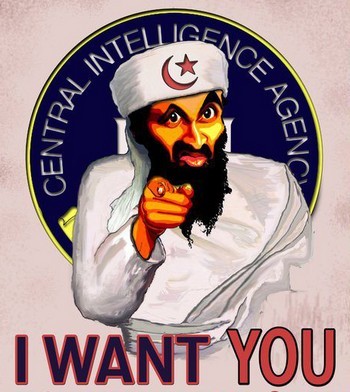 La Syrie est inondée de terroristes en tous genres. Al-Qaeda vient d’y commettre une série d’actes terroristes. D’après l’ancien commandant de l’Académie navale turque, l’Amiral Türker Erturk, ces actes ont été commis avec l’assentiment des Etats-Unis. L’Amiral turc affirme que l’Occident et ses alliés arabes ont décidé de réitérer le “scénario du Salvador”, en comptant davantage, pour parachever le travail, sur les groupes terroristes que sur l’opposition politique. Les attentats suicides de Damas le confirment.
La Syrie est inondée de terroristes en tous genres. Al-Qaeda vient d’y commettre une série d’actes terroristes. D’après l’ancien commandant de l’Académie navale turque, l’Amiral Türker Erturk, ces actes ont été commis avec l’assentiment des Etats-Unis. L’Amiral turc affirme que l’Occident et ses alliés arabes ont décidé de réitérer le “scénario du Salvador”, en comptant davantage, pour parachever le travail, sur les groupes terroristes que sur l’opposition politique. Les attentats suicides de Damas le confirment. 

 del.icio.us
del.icio.us
 Digg
Digg


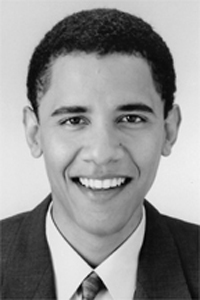
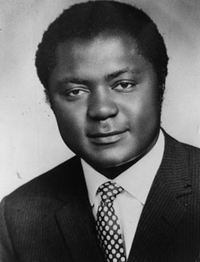
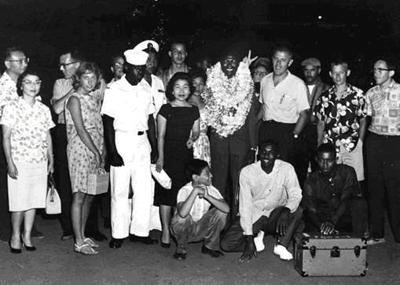
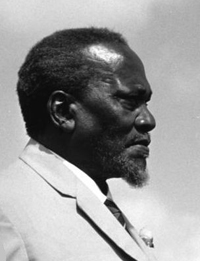








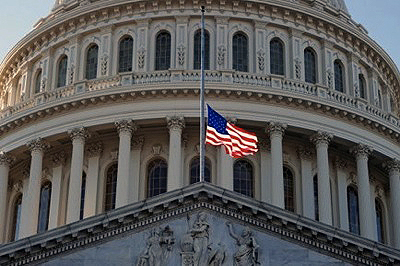

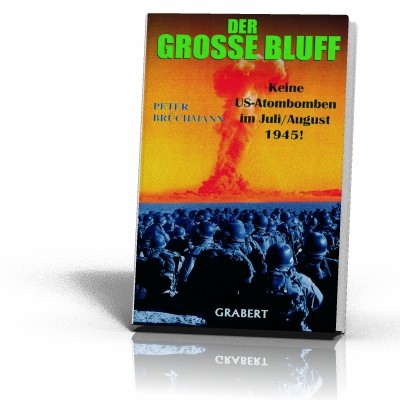

 The manual states, “These operations may be performed as domestic civil support operations,” and adds that “The authority to approve resettlement such opérationswithin U.S. territories,” would require a “special exception” to The Posse Comitatus Act, which can be obtained via “the President invoking his executive authority.”
The manual states, “These operations may be performed as domestic civil support operations,” and adds that “The authority to approve resettlement such opérationswithin U.S. territories,” would require a “special exception” to The Posse Comitatus Act, which can be obtained via “the President invoking his executive authority.” En juin 2006, le lieutenant-colonel retraité de l’US Army, Ralph Peters, s’était fait connaître par la publication dans l’Armed Force Journal d’une carte de sa main (voir ci-dessous) envisageant une complète refonte des frontières du « Grand Moyen-Orient » où G.W.Bush projetait d’injecter la démocratie parlementaire – et de marché ! – à l’occidentale.
En juin 2006, le lieutenant-colonel retraité de l’US Army, Ralph Peters, s’était fait connaître par la publication dans l’Armed Force Journal d’une carte de sa main (voir ci-dessous) envisageant une complète refonte des frontières du « Grand Moyen-Orient » où G.W.Bush projetait d’injecter la démocratie parlementaire – et de marché ! – à l’occidentale.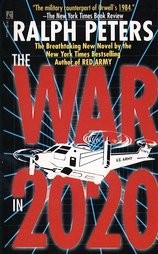 De même, à la mi-mars, New Lebanon
De même, à la mi-mars, New Lebanon